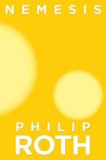
In the "stifling heat of equatorial Newark," a terrifying epidemic is raging, threatening the children of the New Jersey city with maiming, paralysis, lifelong disability, and even death. This is the startling theme of Philip Roth's wrenching new book: a wartime polio epidemic in the summer of 1944 and the effect it has on a closely knit, family-oriented Newark community and its children.
At the center of Nemesis is a vigorous, dutiful twenty-three-year-old playground director, Bucky Cantor, a javelin thrower and weightlifter, who is devoted to his charges and disappointed with himself because his weak eyes have excluded him from serving in the war alongside his contemporaries. Focusing on Cantor’s dilemmas as polio begins to ravage his playground - and on the everyday realities he faces - Roth leads us through every inch of emotion such a pestilence can breed: the fear, the panic, the anger, the bewilderment, the suffering, and the pain.
Moving between the smoldering, malodorous streets of besieged Newark and Indian Hill, a pristine children’s summer camp high in the Poconos - whose "mountain air was purified of all contaminants" - Roth depicts a decent, energetic man with the best intentions struggling in his own private war against the epidemic. Roth is tenderly exact at every point about Cantor’s passage into personal disaster, and no less exact about the condition of childhood.
Through this story runs the dark questions that haunt all four of Roth’s late short novels, Everyman, Indignation, The Humbling, and now Nemesis: What kind of accidental choices fatally shape a life? How does the individual withstand the onslaught of circumstance?
"Bucky's too simple a character to drive the novel, and the traits that make him a good playground director - not very bright, quite polite, beloved, straight thinking - make him a lackluster protagonist. For Roth, it's surprisingly timid." - Publishers Weekly
"Starred Review. Roth, one of our greatest American writers, is unrivaled in his mastery at evoking mid-20th-century New Jersey, but it's the thoughtful examination of the toll guilt takes on the psyche, the futility of raging against God or Fate, and the danger of turning blame inward that give this short novel its power." - Library Journal
"What happens is heartbreaking, but the joy of having met Bucky redeems any residual sadness." - Booklist
"Starred Review... For it is within these short novels that Roth tackles nothing less than the human condition, which finds its nemesis in the mirror." - Kirkus
This information about Nemesis was first featured
in "The BookBrowse Review" - BookBrowse's membership magazine, and in our weekly "Publishing This Week" newsletter. Publication information is for the USA, and (unless stated otherwise) represents the first print edition. The reviews are necessarily limited to those that were available to us ahead of publication. If you are the publisher or author and feel that they do not properly reflect the range of media opinion now available, send us a message with the mainstream reviews that you would like to see added.
Any "Author Information" displayed below reflects the author's biography at the time this particular book was published.
Philip Roth was born in Newark, New Jersey, in 1933. He attended Rutgers University before receiving his B.A. at Bucknell and his M.A. from the University of Chicago. He served in the U.S. Army from 1955 to 1956. He taught English at a number of universities including the University of Pennsylvania where he was writer-in-residence for fifteen years. His first book, Goodbye, Columbus and Five Short Stories, was published in 1959 and won the National Book Award for fiction. Patrimony (1991) was the recipient of the National Book Critics Circle Award, Operation Shylock (1993) of the PEN/Faulkner Award, Sabbath's Theater (1995) of the National Book Award. American Pastoral was his twentieth book. In 2005, he became the third living American writer to have his work published in a ...




Happiness belongs to the self sufficient
Click Here to find out who said this, as well as discovering other famous literary quotes!
Your guide toexceptional books
BookBrowse seeks out and recommends the best in contemporary fiction and nonfiction—books that not only engage and entertain but also deepen our understanding of ourselves and the world around us.